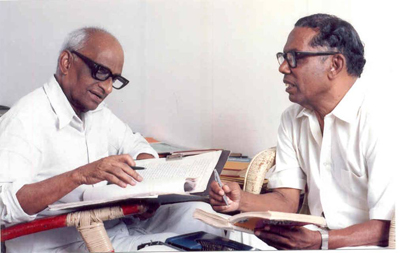
S. Sivapathasundaram (right) with Chitti Sundararajan...
successful collaborators.
|
C. Rajagopalachari, who resisted writing forewords to books, wrote "a blessing note" as a foreword to a book by S. Sivapathasundaram, titled Oli Parappuk Kalai (The Art of Broadcasting) and in it he said, "I normally do not agree to write a foreword to any book, when asked, as I feel it is improper for someone who does not know much about the subject to write on someone's hard work. Therefore when I received this book from Siva-pathasundaram with a request for a foreword, I thought I would write him so; but then when I browsed through the book I found it not only interesting but saw it contained the text of a speech by me in 1938 and it was an opinion of mine then, which has remained an opinion even now. I was amused; I told myself that it was rather true that I am considered a man of strong views; probably this or the get-up of the book attracted me, that I completed reading it. The book did attract me..." The book was published simultaneously in Madras and Colombo in November 1954.
Rajaji at the end of his foreword, titled by the author as "Rajaji's blessings", says, "... the people connected with broadcasting, the artistes, the writers and broadcasters, who worship this God – Radio – will find this book very useful. In fact this book should have been named 'Radio Vadhyar' (Radio Teacher)."
Such was his sincerity of purpose whenever Sivapathasundaram wrote anything.
Born in Ceylon on August 15, 1912, Sivapathasundaram emerged as a writer and broadcaster par excellence in his later life though he had studied law at Colombo Law College. He was equally proficient in Tamil, English and Sanskrit. He edited Eezha Kesari after V. Ramaswami Iyengar (Va. Raa) left and followed Tamil writing in India very closely. In 1941, he joined Radio Ceylon. He was later recommended by the South East Broadcasting Company to the British Broadcasting Corporation. He joined the BBC in 1947 in London where he, along with some like-minded associates, started the programme Thamizhosai that became popular wherever Tamil was spoken. After three years with the BBC, he, much to that Service's disappointment, returned to Ceylon where, before long, he found the political conditions not conducive for his interests. Therefore, after a stint with Lever Brothers in Colombo in its marketing department, he came to Madras and, in time, obtained Indian citizenship.
Married to Gnanadeepam, the couple had three children, Ravilochanan and Manjubhashini (both UK citizens – the daughter practises medicine in London) and Prasannavadani. Prasanna joined Kalakshetra in Madras and became a favourite pupil of Rukmini Devi. Prasanna was featured as the Bharata Natyam dancer in the series of postage stamps on Indian Traditional Dance that were released in 1975 by the Postal Department. Unfortunately, she died in tragic circumstances in Madras.
The first travelogue Sivapathasundaram wrote was Manikkavasagar Adichuvattil ('In the Footsteps of Manikkavasagar') in 1947. Nine years later he wrote The Art of Broadcasting. Then followed his second travelogue, Gauthama Budhar Adichuvattil (1960), followed by Sekkizar Adichuvattil (1978), emulating William Norton's travels of Jesus Christ 'In the Footsteps of The Master'.
It was in Colombo, in the 1930s, that Sivapathasundaram was introduced to Manikkodi, the renaissance Tamil journal and became a fan of the writers of that genre. He read Andhimanadarai by Chitti Sundararajan and was so attracted by the style of the author that, on Radio Ceylon, he spoke highly of Chitti who was then editing Vanoli, the programme magazine of All India Radio, Trichinopoly.
After settling in Madras, Sivapathasundaram became a close associate of Chitti and started researching Tamil novels and Tamil short stories. Together they published their two magnum opuses: The Tamil Novel: A Century of Growth (1977) and Tamilil Sirukathai – Varalaarum Valarchityum (1989). Both became the basic source for many researchers. Both of them then felt it was necessary to have an organisation to help researchers and, with the approval of the Government of India, Ministry of Culture and Education, started Arangam (stage). Many scholars, including foreigners, were benefited by the organisation.
During a visit to the UK, Sivapathasundaram unearthed the first verse novel written in Tamil by D.V. Seshaiengar, in the British Museum Library. According to Chitti, "...this novel titled Aathiyur Avathani was published in 1875, four years before the first prose narrative by Vedanayakam Pillai came out." The other work he found in London was one of the earliest commentaries on Silappadikaram by Pranadarthiharan, serialised in a journal (1889-1902).
D.A., writing in his column "Between you and me" (The Hindu, May 25, 1987), said, "In more recent years, he (Chitti) has been collaborating in literary research with his lifelong friend Mr. Sivapathasundaram, who might be well described as his intellectual twin brother. Like Castor and Pollux, they have been bravely at work, taming intractable subjects like modern Tamil fiction."
Sivapathasundaram played a key role in the successful conduct of the All India Tamil Writers' Conference in 1959. He was also the Secretary of the committee for the B.R. Rajam Iyer centenary celebrations.
His coverage of any event was so good, especially during direct relay, that All India Radio used Sivapathasundaram for commentary during the final processions of Kamaraj and Annadurai.
On May 16-17, 1996, Madurai Kamarajar Universitry, in collaboration with the University Grants Commission, conducted a seminar on 'East West Literary Ties'. The Hindu wrote, "The presence of the grand old man of letters, Mr. P.G. Sundararajan (Chitti) and his literary twin, the great Ceylon scholar Mr S. Sivapathasundaram, described as 'the Beaumont and Fletcher of Tamil literary criticism', lent dignity to the seminar."
Sivapathasundaram passed away in London on November 8, 2000.
|